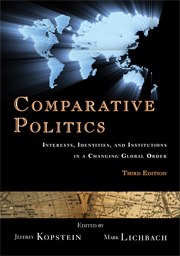Book contents
- Frontmatter
- Contents
- List of Maps
- Preface to the Third Edition
- List of Contributors
- 1 What Is Comparative Politics?
- 2 The Framework of Analysis
- PART ONE EARLY DEVELOPERS
- 3 Britain
- 4 France
- STOP AND COMPARE
- PART TWO MIDDLE DEVELOPERS
- PART THREE LATE DEVELOPERS
- PART FOUR EXPERIMENTAL DEVELOPERS
- Index
- References
3 - Britain
from PART ONE - EARLY DEVELOPERS
- Frontmatter
- Contents
- List of Maps
- Preface to the Third Edition
- List of Contributors
- 1 What Is Comparative Politics?
- 2 The Framework of Analysis
- PART ONE EARLY DEVELOPERS
- 3 Britain
- 4 France
- STOP AND COMPARE
- PART TWO MIDDLE DEVELOPERS
- PART THREE LATE DEVELOPERS
- PART FOUR EXPERIMENTAL DEVELOPERS
- Index
- References
Summary
Introduction
Britain is the usual starting point for comparative politics textbooks because its political system has some similarities with the U.S. system, but also some important differences. Furthermore, most people see the British political system as very successful, having endured for centuries, and thus worthy of study and emulation. Britain has strong and stable political institutions, a firmly established national identity, and a society in which individual freedoms are well protected and social interests vigorously defended.
Britain does indeed enjoy highly stable political institutions that have been in place for centuries. But this very stability has inhibited much-needed structural reform. Britain is headed into the twenty-first century with nineteenth-century political institutions. Important constitutional reforms introduced in the 1990s include the reform of the House of Lords (the upper house of Parliament), and the introduction of parliaments for Scotland and Wales for the first time in 300 years. Britain has also come under increasing pressure to integrate British institutions with those of the European Union (EU), which it joined in 1973.
But these reforms are inadequate to address the deep contradictions within the British model that have provoked a sense of profound political malaise. The system of prime ministerial government produces strong leadership, but vests excessive power in the hands of the prime minister. The sense of crisis goes beyond tinkering with political institutions.
- Type
- Chapter
- Information
- Comparative PoliticsInterests, Identities, and Institutions in a Changing Global Order, pp. 40 - 85Publisher: Cambridge University PressPrint publication year: 2008

